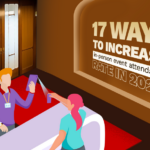Have you been tasked with organizing the next B2B event for your company? Even if this isn’t your first rodeo, each time can feel like the first time—nerve-wracking. You’d have to plan the event format, find keynote speakers, and schedule the event activities while staying within a budget. We get it!
Sometimes, knowing what type of event to choose is as clear as day. Want to plan an event for your company’s executives and high-profile clients? A VIP event will suffice.
But more often than not (and probably for this event you’re trying to plan), you’d have to consider several types of events with intersecting characteristics that can help you achieve the goals your event stakeholders and sponsors set.
So, how do you decide on the kind of event to organize? We’re here to help! In this piece, we’ll review a comprehensive list of 15 event types and their characteristics so you can confidently spearhead your next B2B event and create an attendee experience that’ll be the month’s talk.
What are the Different Formats of Events?
But first… what are the different B2B event formats? Your event format means the mode through which your attendees will engage with speakers and every event activity.
Let’s take a look at the three main event formats. B2B events can be:
1. In-Person Events
In-person events are precisely what they sound like—attendees, speakers, and sponsor brands attending them in a physical venue. These events encourage more natural connections and active participation, especially while networking.

Pic Courtesy: Freepik
Complementary team-building activities like games, workshops, and picnics are also possible with in-person events.
On the flip side, organizing an in-person event means you’ll have to budget more—renting a physical hall, food, conference swag, logistics, etc. In-person-only events also cap the number of attendees you can accommodate, and some people won’t be able to attend simply because they are too far away.
2. Virtual Events
Virtual events are hosted over the Internet. Attendees access the event via their digital devices—smartphones, tablets, PCs, etc. Virtual events have become popular since the Covid-19 pandemic and are here to stay.
The most important benefit of a virtual event is having as many attendees as possible. Also, virtual events are not restricted geographically—attendees can attend from anywhere worldwide without commuting to a physical location. Finally, with a virtual event, most expenses associated with in-person events become non-existent.
3. Hybrid Events
For the most reach, hybrid events combine the best of both worlds– in-person and virtual events. The event is hosted in a physical location for walk-in attendees but is also streamed online and even recorded so people can rewatch the event at their convenience.
Most B2B events hosted today are hybrid events. With a hybrid event, you exponentially increase your audience reach and give your attendees flexibility in engaging with your event.
15 Types of Events That You Must Know About
Ready to see the different types of events you should know as an event planner? Note that this list only covers business-to-business event types, not business-to-customer (B2C) events. Let’s dive right in!
i) Conferences
Conferences are the ‘big daddies’ of events. At a conference, experts, speakers, enthusiasts, and representatives from different companies convene to share ideas, discuss industry trends, and learn about a specific core topic.
A conference is usually held over a few or several days and involves lectures, talk shows, breakout sessions, Q&A sessions, fun activities, you name it. A conference does it all regarding event goals—impart knowledge, foster networking, raise brand awareness, etc.
Because of the sheer scale and resources involved in a conference, they are usually organized annually or every few years.
Digimarcon is one of the biggest B2B conferences in the world, held in the U.S. and 17 other countries. Speakers are renowned digital marketing experts who share insights on emerging strategies and innovative techniques. The conference also features the opportunity to network with thought leaders and other professionals.
ii) Seminars
A seminar is an event where professionals learn about a specific topic. Often, seminars are in-company events organized for staff to improve their skills.

A seminar typically features lectures, discussion groups, interactive Q&A sections with industry experts, and workshops where attendees engage in a physical learning activity spearheaded by an expert.
Seminars are a great way to encourage healthy employee bonds and foster communication. A seminar typically hosts a few dozen people so speakers can connect more personally with attendees.
iii) Workshops
Workshops focus on learning a new skill practically. Instead of sitting for hours on end listening to lectures and talks, in a workshop, an expert demonstrates how to carry out an activity, and then attendees try to replicate the same activity to achieve the desired result.
Workshops are great because they allow attendees to learn about a particular topic of interest that may or may not be related to your company. You can read our article, Conference vs. Seminar vs Workshop: What’s The Difference?, to learn more about these B2B events and what sets them apart.
Some great B2B workshop ideas include learning digital marketing strategies and using new industry tools – CRM software, data analysis, email marketing, live negotiation and sales techniques, etc. Visual learning makes picking up a new skill much more accessible. A workshop can be an event or attached as a side activity to a conference.
Content Marketing World is a B2B workshop created by the Content Marketing Institute that brings together marketing professionals, content creators, marketing agencies, and others to learn new marketing skills and ideas. A vital part of the event is the AI in Marketing deep-dive workshop.
iv) Trade Shows
Trade shows or fairs are events where different businesses and companies in an industry come to showcase their products and services and generate leads.
In a trade show, each vendor typically has a stand to display their products, and then attendees walk through and inquire about the vendors’ products.

A trade show is one of the best events for generating new leads, observing competitors’ activities, sealing exclusive vendor partnerships with retailers, and connecting more deeply with current clients.
What’s more? Unlike other marketing channels, you are engaging directly with businesses who already have a deep interest in your services and are looking to sign up – and you have their full attention.
The B2B Marketing Expo is a two-day trade show featuring over 150 exhibitors, 100 speakers, and 5,000 visitors. B2B suppliers and expert speakers demonstrate the latest technologies and discuss the most innovative services.
v) Exhibitions
Exhibitions are similar to trade shows in that they showcase products and services but are usually organized by only one company. Exhibitions are excellent for companies with several product lines or services within a provided suite.
An exhibition is a great way to create awareness and promote your current products and services to new leads and businesses that know little about your brand. It is also a great avenue to showcase new products and upgrades to your current clients.
When organizing an exhibition, you’ll have to do a lot of marketing to get the word out and attract visitors. The more attendees you get, the more exposure your brand gets as they discuss and share posts across social media and via word-of-mouth.
The SmallBusinessExpo is one of the largest B2B exhibitions in the U.S. Business owners, entrepreneurs, and startups explore a diverse range of exhibitors and vendors, attend workshops & seminars, listen to keynote presentations, and engage with potential clients, vendors, and stakeholders.
vi) Corporate Off-site & Executive Meetings
In corporate off-site events and executive meetings, employees are taken to a different location outside the company premises and office setting. A corporate off-site event may be held for one or a few days.
Great ideas for corporate off-site event locations are golf courses, escape rooms, karaoke bars, cinemas, restaurants, etc. The point of a corporate off-site event is to create a memorable experience for your staff by engaging in a fun activity together.
vii) Product Launches
A product launch is an event organized to announce and debut the launch of a new product or service into the market. It focuses entirely on one company’s product.
Product launches often feature attendees like investors, long-term clients, company executives, social media influencers, bloggers, and the press. They should be exciting—red-carpet-worthy even—to create buzz and talk about your product.
viii) Networking Events
A networking event is an overarching term for an event where professionals in an industry come to network, share ideas, and exchange information. Common attendees to networking events are company representatives, executives, recruiters, etc.

Fun and relevant activities you can organize in a networking event include business card swapping, games with rewards, interactive talk shows, icebreakers where guests introduce themselves, roundtable discussions and eating, speed networking, etc. Read our article, ‘29 Dynamic Networking Event Ideas to Make a Lasting Impression‘, to learn about the different types of networking events that you can plan.
Hubspot’s Inbound is one of the US’s most reputable B2B networking events. Experts connect and discuss the latest in marketing and AI. The event also features workshops, educational breakouts, and unique networking sessions.
ix) Webinars
A webinar is an online seminar allowing attendees worldwide to participate via their digital devices. Attendees engage in webinars by taking virtual polls and typing in or asking questions.
Webinars typically attract people who are interested in a particular topic or industry. Experts with large online followings usually organize them. A webinar can also be held in-house for a specific company with a remote workforce.
Webinars are also great tools for companies to educate potential leads on their products and services. The ContentTECH Summit is a webinar organized by the Content Marketing Institute for B2B marketing professionals. The program features content marketing leaders and brand innovators sharing insights and practical advice to help content marketers unlock the potential of content technology.
x) Awards Function
An awards function is an event where a company celebrates employees who have achieved spectacular results. Recognizing employees’ contributions makes them feel valued and more motivated to do better. An awards function also shows that a company appreciates hard work.
Award functions should be flashy and compulsory for all employees to attend. Previous employees and retirees can also be invited to give motivational speeches to boost morale. Awards will typically be presented by awardees of earlier years.
xi) VIP Events
VIP events are organized for top company executives—shareholders, investors, managers, directors, CEOs—and high-profile clients to create a feeling of exclusivity. They allow companies to connect more deeply with their big clients and loyal customers.
Typical highlights of VIP events are red-carpet entrances, sneak peeks at unannounced product launches, luxury venues, premium swag items, and chef’s choice food. Guests at VIP events expect special treatment, so event planners should prepare accordingly to strengthen business ties.
xii) User Groups
User groups are events organized by B2B companies for businesses that use their products and services. Attendees engage with the brand to share their feedback, suggest improvements, and get support on effectively using the product.
User groups give companies the best opportunity to get in-person reviews and learn how to serve their clients better. A user group should make the attendees feel like the event is about them and focus on open discussions rather than corporate talk.
The LN NAUG Face-to-Face Annual Meeting is a classic example of a user group event where Infor LN ERP software users connect with other enterprise users and discuss with the company’s executives. Each event day features networking breakfasts plus vendor expos and breakout sessions.
xiii) Team Building Events
Team-building activities and events are designed for employees of a particular company to share memorable experiences and encourage teamwork.
Team-building events should feature talks on the importance of teamwork and team-building activities your attendees will engage in. Some fun ideas for team-building events include picnics, tug-of-war, community service, games like Human Knot, an escape room, office trivia, an awareness circle, etc.
By carrying out activities together, employees learn each other’s strengths and how to delegate tasks to achieve a goal. Read our article, 40 Team-Building Activities That Will Influence Your Employees To Perform Their Best to learn more about team-building events one can plan.
xiv) Charity Events / CSR Events
Charity events create awareness and raise funds to sponsor a particular cause, non-profit, or charity establishment. They foster a sense of community around a common cause.

Pic Courtesy: Freepik
Another great thing about charity events is they appeal to each attendee present, giving them a sense of fulfillment as they donate to help people in need. Charity events are also excellent opportunities for company execs to network with high-networth individuals and initiate potential partnerships.
xv) Immersive Corporate Events
Immersive corporate events are designed to engage as many senses of attendees as possible to maximize attendee participation. These events may feature emerging event technology like Virtual Reality (VR) and Mixed Reality (MR) or creativity-stimulating activities to make attendees deeply invested in the experience.
Some great examples of immersive event activities include virtual reality escape rooms, silent discos, VR games, live art creation, scavenger hunts, and customize-your-own-food buffets.
Sitting for long hours listening to talks can get boring. However, these immersive events are a ‘breath of fresh air’ that will give your attendees a fun experience.
Key Takeaway
As an event planner, it is essential to understand the different types of events and where they make the most sense for your company. Some key factors that will influence your decision are the goals you are trying to achieve with the event, the physical location of your attendees, and your event budget.
The 15 event types we just discussed give you a solid reference from which to start. By considering these factors, you’ll be able to choose the right format and type of event to organize next.
As an event planner, having the right tools in your arsenal simplifies the event planning process. And here’s how Eventible helps:
Eventible is our exclusive review platform for event teams and organizers. It allows them to effectively measure event ROI and capture social proof for events they have organized, establishing their credibility and driving conversions for future events. Claim your account and access your event organizer portal today!





Comments are closed.